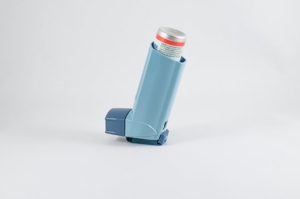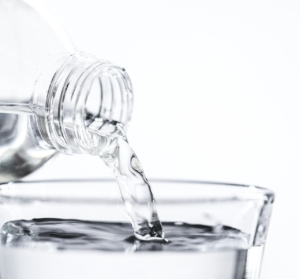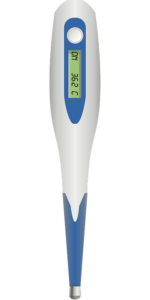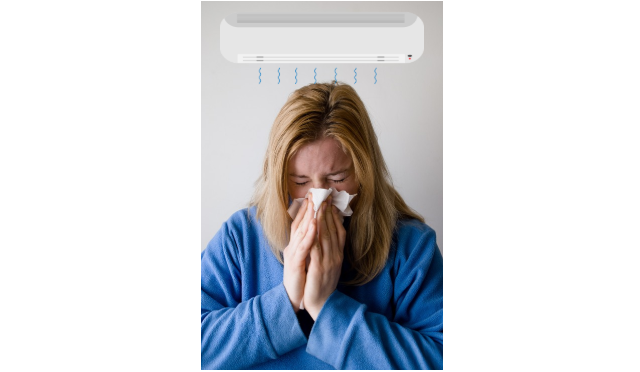So, how can air conditioning affect your health? Can you get a cold from air conditioning? Is there any truth to the negative health effects of air conditioning? Read on to find out.
Can You Get Sick From Air Conditioning?
One of the most common myths regarding air conditioning is that the cold air circulated through the system will give you a cold. In fact, it is a myth that cold air causes colds altogether, whether it be winter or via air conditioning. The main reason that colds are so common during the cooler winter months is that people are more likely to stay indoors which allows germs to spread more easily.
Although cold air can contribute to someone getting sick, this will only happen if that person has already been exposed to a virus.
Health Benefits Of Air Conditioning
Improves Respiratory Conditions

One widely known benefit of air conditioning is that it can be used to ease common respiratory conditions such as asthma and hayfever. This is because the system circulates fresh air into the room and removes contaminants from that can aggravate respiratory conditions such as pollen, dirt, and dust.
Air conditioning can also be used to control humidity in order to ease respiratory conditions as well as prevent breathing problems caused by breathing in humid air for an extended period of time.
However, it is important to regularly clean and maintain your air conditioner for maximum health benefits. In fact, a poorly maintained air conditioner can aggravate or even cause respiratory conditions. This is because the air conditioner’s filter will eventually become clogged with dirt and dust particles eventually allowing those particles to be circulated back into the room.
To get the most out of your air conditioner call ACS today on 0403 254 272 to book in a service.
Prevents Dehydration & Heatstroke
 The main reason that air conditioning has become a staple in Australian homes is to create a comfortable environment to survive the harsh Australian sun. However, the cool air your air conditioner provides also prevents heat related health conditions such as dehydration and heat stroke.
The main reason that air conditioning has become a staple in Australian homes is to create a comfortable environment to survive the harsh Australian sun. However, the cool air your air conditioner provides also prevents heat related health conditions such as dehydration and heat stroke.
This is due to the fact that high temperatures cause the body to sweat in order to regulate body temperature which can cause dehydration. The reduced air temperature from air conditioning also reduces the risk of organ failure and brain damage due to heatstroke.
Improves Air Quality
Air conditioning also offers health benefits for those without any health issues. Not only will air conditioning keep you cool on a hot day, reducing the risk of heat related illnesses such as dehydration and heat stroke, the filtration system also improves air quality.
This is due to the fact that indoor air can become stale allowing any fumes or toxins in the air to linger which can cause health problems. Conversely, an air conditioner is constantly removing stale air from the room and simultaneously pumping in new, cool, filtered air in order to improve air quality in the room and reduce health risks.
Maintains Body Temperature
 One widely known benefit of air conditioning is that it keeps you cool in hot weather (and warm in cold weather for reverse cycle air conditioning units). However, not only will the climate controlled air keep you comfortable year round, it can also prevent illnesses caused by sudden or frequent temperature changes such as pneumonia, coughing, fever, and more.
One widely known benefit of air conditioning is that it keeps you cool in hot weather (and warm in cold weather for reverse cycle air conditioning units). However, not only will the climate controlled air keep you comfortable year round, it can also prevent illnesses caused by sudden or frequent temperature changes such as pneumonia, coughing, fever, and more.
Additionally, when you have to regulate your own body heat the energy needed to do so is taken from other parts of the body. This can leave you feeling fatigued and run down your immune system making you more susceptible to illness. Conversely, in a temperature controlled environment your body is left well equipped to fight off potential infections and other potential health issues.
Negative Health Effects Of Air Conditioning
Although a regularly serviced air conditioning unit has many health benefits, there are also potentially negative health effects that can be caused by a poorly maintained air conditioning system.
Reduced Air Quality
Air conditioners contain a filter that is used to remove harmful particles including, dirt, dust, and allergens from the air. However, air conditioning filters should be regularly changed for maximum efficiency.
When neglected, air conditioning filters can build up dust and dirt particles to the point where the filter is no longer effective and may even release the dust particles from the filter into the air. Additionally, if mold forms in the air conditioning system due to lack of regular maintenance the mold may be circulated through the air which can cause serious health problems.
Bacteria Spread
In air conditioners that use water to cool the air there can be bacteria present called legionella which can cause legionnaires disease. However, this method of cooling air is generally not used in home air conditioners.
Additionally, in an office situation or in a space used by many people, bacteria from one sick person can get into the air and be circulated by the air conditioning unit.

Neglecting your air conditioner’s maintenance can open you and your household up to a range of potential health and safety issues. If you can’t remember the last time you serviced your air conditioner give Advanced Climate Solutions a call. We offer stress-free air conditioning servicing at competitive prices Brisbane wide. Call us today on 0403 254 272 or fill out our contact form.
*https://www.cdc.gov/features/extremeheat/index.html


